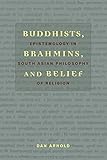Buddhists, Brahmins, and Belief : Epistemology in South Asian Philosophy of Religion / Dan Arnold.
Material type: TextPublisher: New York, NY : Columbia University Press, [2008]Copyright date: ©2008Description: 1 online resource (328 p.)Content type:
TextPublisher: New York, NY : Columbia University Press, [2008]Copyright date: ©2008Description: 1 online resource (328 p.)Content type: - 9780231132817
- 9780231507790
- 121/.0954 22
- BQ4440 .A76 2005eb
- online - DeGruyter
- Issued also in print.
| Item type | Current library | Call number | URL | Status | Notes | Barcode | |
|---|---|---|---|---|---|---|---|
 eBook
eBook
|
Biblioteca "Angelicum" Pont. Univ. S.Tommaso d'Aquino Nuvola online | online - DeGruyter (Browse shelf(Opens below)) | Online access | Not for loan (Accesso limitato) | Accesso per gli utenti autorizzati / Access for authorized users | (dgr)9780231507790 |
Browsing Biblioteca "Angelicum" Pont. Univ. S.Tommaso d'Aquino shelves, Shelving location: Nuvola online Close shelf browser (Hides shelf browser)

|

|

|

|

|

|

|
||
| online - DeGruyter Lothagam : The Dawn of Humanity in Eastern Africa / | online - DeGruyter A Short History of Opera / | online - DeGruyter The Wealth of Nature : How Mainstream Economics Has Failed the Environment / | online - DeGruyter Buddhists, Brahmins, and Belief : Epistemology in South Asian Philosophy of Religion / | online - DeGruyter Love, Amy : The Selected Letters of Amy Clampitt / | online - DeGruyter Adenauer's Germany and the Nazi Past : The Politics of Amnesty and Integration / | online - DeGruyter Sewing Women : Immigrants and the New York City Garment Industry / |
Frontmatter -- Contents -- Acknowledgments -- Introduction: On the Rational Reconstruction of South Asian Philosophy -- PART I: BUDDHIST FOUNDATIONALISM -- PART II: THE REFORMED EPISTEMOLOGY OF PŪRVA MĪMĀ M̩̩SĀ -- PART III: THE METAPHYSICAL ARGUMENTS OF MADHYAMAKA -- Notes -- References -- Index
restricted access online access with authorization star
http://purl.org/coar/access_right/c_16ec
In Buddhists, Brahmins, and Belief, Dan Arnold examines how the Brahmanical tradition of Purva Mimamsa and the writings of the seventh-century Buddhist Madhyamika philosopher Candrakirti challenged dominant Indian Buddhist views of epistemology. Arnold retrieves these two very different but equally important voices of philosophical dissent, showing them to have developed highly sophisticated and cogent critiques of influential Buddhist epistemologists such as Dignaga and Dharmakirti. His analysis-developed in conversation with modern Western philosophers like William Alston and J. L. Austin-offers an innovative reinterpretation of the Indian philosophical tradition, while suggesting that pre-modern Indian thinkers have much to contribute to contemporary philosophical debates.In logically distinct ways, Purva Mimamsa and Candrakirti's Madhyamaka opposed the influential Buddhist school of thought that emphasized the foundational character of perception. Arnold argues that Mimamsaka arguments concerning the "intrinsic validity" of the earliest Vedic scriptures are best understood as a critique of the tradition of Buddhist philosophy stemming from Dignaga. Though often dismissed as antithetical to "real philosophy," Mimamsaka thought has affinities with the reformed epistemology that has recently influenced contemporary philosophy of religion.Candrakirti's arguments, in contrast, amount to a principled refusal of epistemology. Arnold contends that Candrakirti marshals against Buddhist foundationalism an approach that resembles twentieth-century ordinary language philosophy-and does so by employing what are finally best understood as transcendental arguments. The conclusion that Candrakirti's arguments thus support a metaphysical claim represents a bold new understanding of Madhyamaka.
Issued also in print.
Mode of access: Internet via World Wide Web.
In English.
Description based on online resource; title from PDF title page (publisher's Web site, viewed 02. Mrz 2022)


